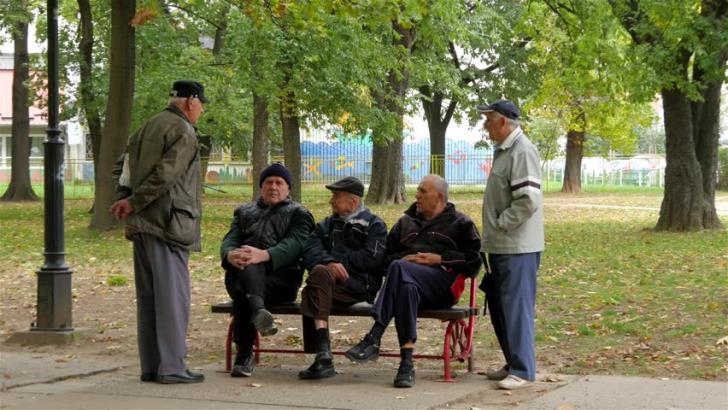Around one in four (42%) of people over 60 years old feel lonely, and 30% consider low pensions to be one of the biggest problems of old age, according to a survey ordered by the Cabinet, concerning the social and psychological needs and experiences of individuals aged 60 and over.
The survey also found that women and the elderly (people over 80) feel more fear and insecurity, while about one in three and one in four call for the creation of activity centres and more support from the state.
The main activities of the elderly and the very old are the Church and watching television, while it is noted that individuals aged 60-69 dedicate a lot of time to their grandchildren, the survey showed.
The results of the study, which was carried out by Insights Market Research (IMR) of the University of Nicosia, never saw the light of day, and as Professor Konstantinos Fellas, the head of the research, tells Phileleftheros, “they never received the necessary attention or/and were not utilised, although they give us serious indications of the reality of the elderly in Cyprus”.
“Strictly speaking, this particular study concerns people over 60 in Cyprus, and certainly, we cannot characterise individuals aged 60-69 as ‘elderly’ in the traditional sense”, Fellas clarified. However, from the analysis of the data, he said, ‘we see that in the older age groups, some things are very pronounced, and thus there is a clear distinction in the conclusions depending on age’.
Most seem to experience loneliness (42%), while the second biggest problem for Cypriot pensioners is their financial situation and low pensions (30%). 14% mention health problems, while 12% feel fear and insecurity.
Difficulty in movement and transportation (8%), indifference from the state (8%), neglect by family members (6%), lack of occupation (6%), racist behaviour (3%), and neglect in nursing homes (3%) are some of the other problems recorded.
Women seem to experience more loneliness (58%). The same goes for financial difficulties. 42% were women. From further analysis of the data, it seems that loneliness is felt more by the very old (67%), while insecurity and fear are felt more by people aged 70-79.
79% of the research participants stated that they watch television. 58% of Cypriot pensioners read, and the same percentage cook. A large percentage, 41%, mentioned taking care of their grandchildren, with these individuals mainly belonging to the 60-69 age group (52%). 26% take care of their garden. However, it is particularly interesting that only 1% (over 70 years old) mentions meeting with friends as a form of occupation.
Regarding their social activities, 53% mentioned going to church, 37% included exercise in their activities, 23% added participation in charitable organisations, and 20% seemed to attend art classes or music groups, etc.
Living conditions:
-61% live in their own home
-24% in a rented home
-9% in refugee housing
-5% live with their children
Regarding their transportation, the research participants mentioned:
-63% personal car
-27% friend’s or relative’s car
-26% on foot
-22% bus
-2% bicycle
-2% motorcycle
-1% taxi
42% leave their house daily, and 41% do so 2-3 times a week. 4% leave the house less often, while 13% do so once a week. 43% of participants also stated that there are times when they cannot leave the house even though they want or need to.
It is noteworthy that 54% said they avoid going out due to financial difficulties. 41% cited dependence on others, 26% cited a bad mood, 21% cited poor health, 15% cited a lack of transportation, and 10% cited a lack of support and help.
However, what do they need to increase their socialisation?
-67% mentioned more frequent bus routes
-41% asked for more pavements
-28% referred to the need for accompaniment by another person
-26% referred to the need for accessible buses
-15% to the need for better prices from taxis
The income of retired individuals over 60 years old in Cyprus comes from pensions (61%), their employer’s retirement plan (9%), other state benefits (8%), help from family members (5%), and part-time employment (2%).
Forty-six per cent say their income is enough to meet their needs, 24% say their income is more than enough, and the rest say it is less than they need. Thirty-eight per cent cited a lack of money as an obstacle to their activity.
Twenty-one per cent often feel bored and monotonous, and 17% feel this way very often. Ten per cent feel anxious and stressed very often, and 23% feel this way quite often, while 28% feel lonely very often.
It is encouraging that 59% of retirees reported having people they can rely on, and 61% said that there are people who make sure they receive the necessary care.
Need for state intervention
Specific suggestions arose from the study’s results, said Professor Konstantinos Fellas, noting that the participants themselves gave their own direction. Thirty-five per cent said that activity centres should be created, 25% said they needed more support from the state, and 19% said that pensions should be increased.
‘We observe, among the findings, that our retirees, especially in the older age groups, feel loneliness, fear, and insecurity, anxiety, and financial constraints more intensely. The fear of dependence is a side effect of ageism and is perpetuated by the widely spread illusion of independence.
Western culture is deeply immersed in the mentality of harsh individualism – ‘I can manage on my own’ – and has the misconception that maintaining independence and avoiding dependence on others is not only preferable but also admirable and expected. The truth is that we are never completely independent, nor should we strive to be, especially as we get older. The pursuit of complete independence sets the stage for dependence to be perceived as a failure, further stigmatising the loss of ability.'”






